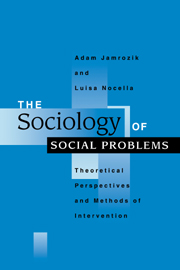Book contents
- Frontmatter
- Contents
- List of Tables
- List of Figures
- Preface and Acknowledgements
- 1 Introduction: Theoretical Perspectives on Social Problems
- 2 Contemporary Perspectives on Social Problems
- 3 Methods of Intervention in Social Problems
- 4 Social Actors in Social Problems
- 5 Challenges of Contemporary Social Problems
- 6 Social Problems in the Residualist Conversion Perspective
- 7 Inequality – The Underlying Universal Issue in Social Problems
- 8 The Social Construction of Family Problems
- 9 The Problem of Social Order
- 10 The Theory of Residualist Conversion: Does it Meet the Test?
- 11 Conclusions and Implications
- Bibliography
- Index
10 - The Theory of Residualist Conversion: Does it Meet the Test?
Published online by Cambridge University Press: 29 March 2011
- Frontmatter
- Contents
- List of Tables
- List of Figures
- Preface and Acknowledgements
- 1 Introduction: Theoretical Perspectives on Social Problems
- 2 Contemporary Perspectives on Social Problems
- 3 Methods of Intervention in Social Problems
- 4 Social Actors in Social Problems
- 5 Challenges of Contemporary Social Problems
- 6 Social Problems in the Residualist Conversion Perspective
- 7 Inequality – The Underlying Universal Issue in Social Problems
- 8 The Social Construction of Family Problems
- 9 The Problem of Social Order
- 10 The Theory of Residualist Conversion: Does it Meet the Test?
- 11 Conclusions and Implications
- Bibliography
- Index
Summary
In this book, we have sought to provide one complete theoretical framework within which social problems can be analysed. This perspective perceives social problems as social phenomena that emerge in society as a form of threat to the values and interests dominant in that society, and that evoke certain methods of intervention designed to attenuate, control or solve such problems. In the sociological literature concerned with social problems, there has been a division between studies that focus on identification and explanation of social problems, and studies that focus on methods of intervention (the latter studies being more frequent in literature emanating from the helping professions, especially social work). We have attempted to bring these two aspects and two disciplines (theoretical and the applied) together as we consider that studies of social problems are a form of intervention, often the first form of intervention. Also, most sociological theories of social problems that have been formulated over the past century have taken as their main focus various forms of social deviance, with such deviance being perceived as a threat to the social order. While we acknowledge the importance of such perspectives, because a threat to social order is perhaps the most serious threat a society might encounter, we have aimed to focus our attention on the kinds of social problems that occur in society in the course of that society's ‘normal’ activities and pursuits, especially the pursuits of the dominant social strata and social classes.
- Type
- Chapter
- Information
- The Sociology of Social ProblemsTheoretical Perspectives and Methods of Intervention, pp. 199 - 213Publisher: Cambridge University PressPrint publication year: 1998



